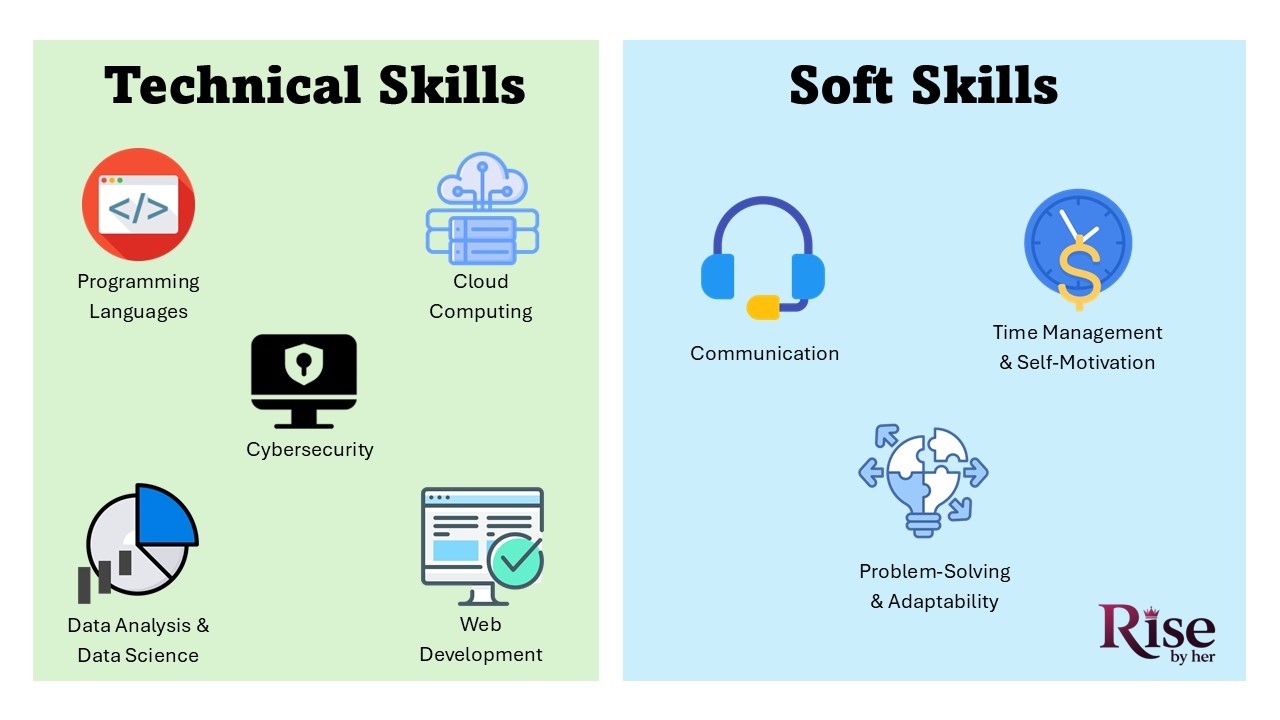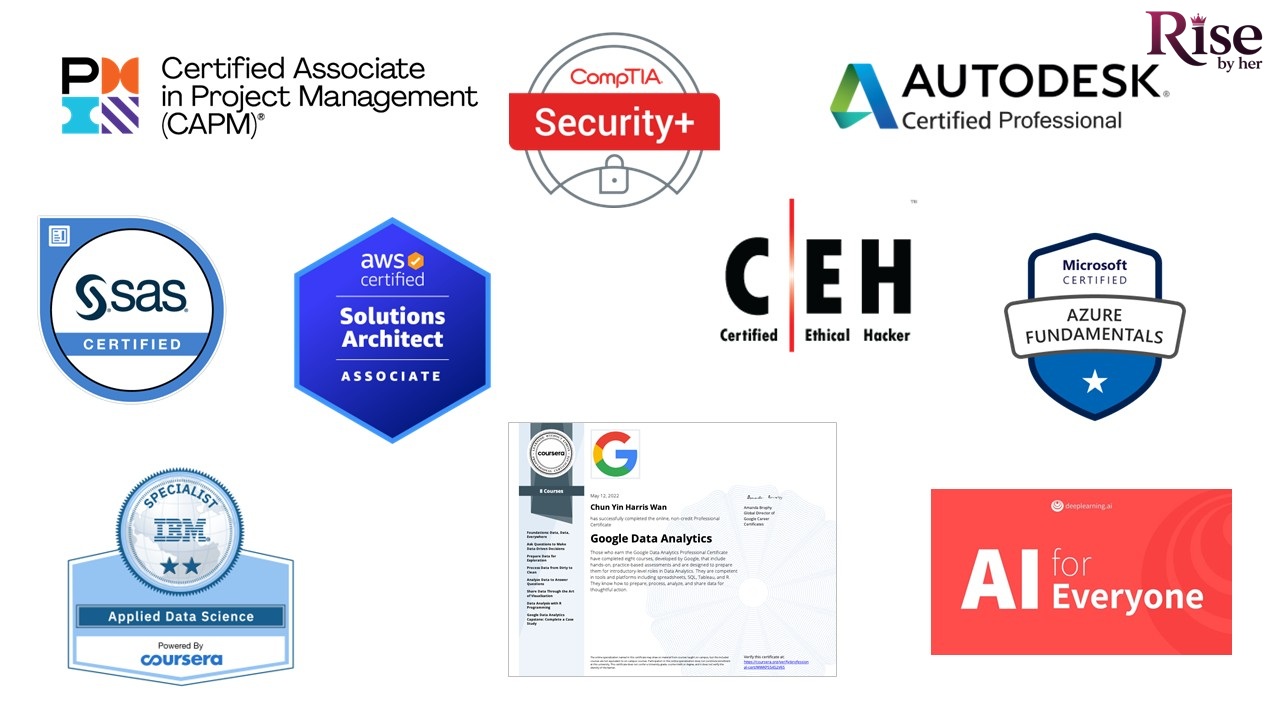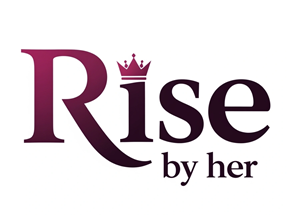Why Women in Tech Are Thriving in Remote Careers
The tech industry has fully embraced remote work, and women in tech are thriving because of it. With more companies offering flexible work-from-home options than ever before, women are finding new ways to grow their careers without compromising on work-life balance or personal goals.
From software development to data science, remote tech roles are unlocking opportunities for women to lead, innovate, and succeed in environments that value results over office hours. Whether it’s cutting out long commutes, having more control over daily routines, or managing family responsibilities, the benefits of remote tech jobs for women go far beyond convenience.
More women in tech are choosing remote work not just for flexibility, but for freedom, the freedom to build a meaningful career on their own terms. If you’re wondering how to make this shift or what it takes to stand out, this post breaks down the essential skills you need to land a remote job in tech and thrive in it.
Top Technical Skills You Need to Land a Remote Tech Job
In today’s remote-first world, technical proficiency isn’t just an advantage, it’s a requirement. For women in tech, mastering key remote tech skills can unlock access to global opportunities, higher salaries, and flexible work arrangements. Whether you’re pivoting into tech or upskilling in your current role, here are the most valuable hard skills to focus on.
Programming Languages
Learning to code is one of the fastest ways to become job-ready in tech. Two languages stand out in the remote job market:
- Python: Known for its simplicity and versatility, Python is essential in data science, automation, artificial intelligence, and back-end web development.
- JavaScript: As the backbone of modern web development, JavaScript is crucial for front-end development and full-stack roles. Frameworks like React, Angular, and Vue are especially sought-after.
Why it matters: Companies need developers who can create, test, and deploy software from anywhere.
Cloud Computing
Remote companies rely heavily on cloud-based systems to scale quickly and stay agile. That’s why cloud expertise is a top priority.
- AWS (Amazon Web Services): The most widely adopted cloud platform, great for infrastructure roles.
- Microsoft Azure & Google Cloud Platform (GCP): Also in high demand, especially in enterprise environments.
Get certified: Earning certifications like AWS Certified Cloud Practitioner or Microsoft Azure Fundamentals boosts credibility and job prospects.
Cybersecurity
With distributed teams comes a bigger risk of cyber threats. That’s where women skilled in cybersecurity come in.
- Learn how to manage firewalls, detect threats, and protect sensitive data.
- Tools & topics: Ethical hacking, penetration testing, risk assessment, network security.
Remote relevance: Remote companies need cybersecurity pros to monitor and secure their networks 24/7, from any location.
Data Analysis & Data Science
Data-driven decision-making is the norm and companies need analysts who can turn raw data into actionable insights.
- Skills to learn: Excel, SQL, Tableau, Power BI, Python (for analytics), and R.
- Bonus: Familiarity with machine learning models is a big plus.
Why it’s great for women: Analytical roles often allow flexible hours and project-based work, perfect for balancing personal and professional life.
Web Development
If you’re creative and enjoy building things from scratch, web development is an exciting and flexible field.
- Front-End: HTML, CSS, JavaScript, and frameworks like React or Vue.
- Back-End: Node.js, Express, databases (MongoDB, PostgreSQL), and REST APIs.
- Full-Stack: A mix of both, often required in startup environments.
Freelance potential: Many web developers work as freelancers or consultants, great for remote flexibility.
By focusing on remote tech skills for women like programming, cloud computing, and cybersecurity, you position yourself as a valuable hire in a competitive market. The good news? You don’t need to master everything. Start with one area aligned with your interests and career goals and build from there.

Essential Soft Skills for Remote Success
Technical skills might get your foot in the door, but soft skills are what help you thrive, especially in a remote work environment. For women in tech, these non-technical abilities play a huge role in standing out, staying productive, and building strong virtual relationships.
Here are the most important soft skills for succeeding in remote tech roles:
Communication (Especially Asynchronous)
In remote teams, clear and thoughtful communication is everything, especially when working across time zones.
- Async tools like Slack, Notion, Loom, and email are essential for updates, task management, and collaboration.
- Knowing how much to share and when to speak up builds trust and transparency.
- Written communication is key: remote teams rely more on messages and documentation than live calls.
Why it matters: Strong communicators can lead projects, manage stakeholders, and avoid misunderstandings, without being “always online.”
Time Management & Self-Motivation
Without a boss physically checking in, your ability to manage your time and stay focused becomes critical.
- Use digital calendars, task lists (like Todoist or ClickUp), and time-blocking strategies to structure your day.
- Knowing when to log off, remote burnout is real.
- Set realistic goals and hold yourself accountable.
Why it matters: Employers love remote workers who are self-starters and dependable without constant supervision.
Problem-Solving & Adaptability
Tech moves fast and remote tech teams need people who can troubleshoot, learn quickly, and adjust to new tools or projects on the fly.
- Whether it’s debugging a feature or learning a new tool, you’ll need to think critically and act quickly.
- Flexibility helps you thrive in evolving team structures, shifting deadlines, or last-minute pivots.
Why it matters: Companies look for team members who can navigate uncertainty and find solutions (even when working solo).
Certifications That Boost Your Remote Tech Career
When you’re aiming for a remote job in tech, certifications can set you apart, especially if you’re transitioning careers or want to showcase up-to-date, in-demand skills. The best part? Many of the top credentials are now 100% remote-friendly and affordable, with flexible learning schedules.
Here are some of the most valuable online certifications for women in tech who want to land or grow in remote roles:

Google IT Support Professional Certificate (Coursera)
- Who it’s for: Beginners exploring tech support or IT roles
- What you learn: Troubleshooting, networking, system administration
- Why it helps: Builds foundational skills for help desk and remote IT roles
- Remote tip: Employers often accept this as a fast-track credential for entry-level roles
AWS Certified Cloud Practitioner
- Who it’s for: Beginners looking to enter cloud computing
- What you learn: Basics of AWS services, cloud concepts, security, and pricing
- Why it helps: Cloud knowledge is in massive demand, and remote AWS jobs are everywhere
- Platform: AWS Skill Builder or Coursera
Microsoft Azure Fundamentals (AZ-900)
- Who it’s for: Entry-level learners exploring Microsoft’s cloud environment
- What you learn: Cloud concepts, Azure services, governance, and compliance
- Why it helps: Many companies hiring remote teams work on Azure platforms
Meta Front-End Developer Professional Certificate (Coursera)
- Who it’s for: Aspiring front-end web developers
- What you learn: HTML, CSS, JavaScript, React, and responsive design
- Why it helps: Great for freelance or full-time remote roles in web dev
IBM Data Science Professional Certificate (Coursera)
- Who it’s for: Women interested in data careers or transitioning into analytics
- What you learn: Python, SQL, data visualization, machine learning basics
- Why it helps: Prepares you for remote data analyst or junior data science roles
Platforms like Coursera and edX offer financial aid and trial periods, perfect for those exploring options before committing. Google Career Certificates even offer job placement support through their employer network.
Where to Learn These Skills (For Free or Low Cost)
You don’t need to break the bank to build in-demand tech skills. Today, there are dozens of platforms offering high-quality tech courses, many of them designed with flexibility, affordability, and accessibility in mind. Whether you’re starting out or upskilling, you can learn coding, data analysis, cybersecurity, and more from the comfort of home.
Here are some of the top platforms for free coding courses for women and affordable tech training:

Coursera: Partnered with universities like Stanford and companies like Google, Coursera offers free courses (with optional paid certificates).
- Great for: Google Career Certificates, IBM Data Science, Meta Front-End Developer
- Tip: Apply for financial aid on most paid courses!
edX: Founded by MIT and Harvard, edX is known for academic-level learning and professional certificates.
- Great for: Microsoft Azure, AI and machine learning, Python
- Free to audit most courses (pay only if you want a certificate)
Udemy: Offers thousands of budget-friendly courses, often on sale for under $20.
- Great for: Coding bootcamps, web dev, cloud computing basics
- Learn at your own pace, lifetime access included
LinkedIn Learning: A trusted platform for business and tech skills, and often free through your library or company.
- Great for: Time management, GitHub, communication tools for remote work
- Free trial available + certificate integration with LinkedIn profile
Women Who Code: An empowering community offering free coding events, workshops, and tech career support tailored for women.
- Great for: Networking, mentorship, specialized skill-building
freeCodeCamp: Completely free and beginner-friendly, freeCodeCamp offers hands-on coding projects and certifications.
- Great for: HTML, CSS, JavaScript, data visualization, responsive web design
Bonus tip: Keep an eye out for scholarships for women in tech, some platforms and nonprofits offer full coverage for premium tech courses, especially if you’re underrepresented in STEM.
How to Stand Out to Remote Tech Employers
Remote tech roles are more competitive than ever. Whether you’re just entering the field or pivoting your career, making yourself visible, credible, and memorable is key.
Here’s how to get hired for remote tech jobs by building a personal brand that recruiters and hiring managers can’t ignore:
Build a Strong Online Presence
Your digital footprint matters, especially when applying for remote roles. Employers often look you up before scheduling an interview.
- LinkedIn: Keep your profile updated with keywords like “remote front-end developer” or “data analyst seeking remote work.”
- GitHub: Showcase real coding projects and contributions to open-source repositories.
- Personal Portfolio: Create a website that highlights your skills, certifications, past projects, and contact info.
Tailor Your Resume for Remote Jobs
When applying to remote roles, your resume needs to reflect remote-readiness.
- Emphasize experience with remote collaboration tools (Zoom, Slack, Notion, Git).
- Include phrases like “worked in fully remote teams” or “self-directed remote learner.”
- Highlight soft skills like self-motivation, time management, and async communication, key for remote success.
Pro tip: Use job-specific keywords from the listing to beat ATS (applicant tracking systems). For example: “Python developer remote” or “remote UI/UX designer.”
Ace the Remote Interview
Interviews for remote roles often take place over video, so practice in a professional, quiet space with good lighting.
- Be prepared to answer questions like: “How do you stay organized while working from home?” or “Describe your ideal remote work environment.”
- Have specific examples of how you’ve communicated across time zones, met deadlines independently, or solved problems virtually.
Pro Tip: Follow up with a personalized thank-you email that reinforces your excitement and includes a link to your portfolio or GitHub.
Conclusion: Start Building Your Remote-Ready Skill Set Today
Breaking into remote tech as a woman is not just possible: it’s powerful. Whether you’re diving into coding, exploring cloud platforms, or leveling up your soft skills, the best time to start is now.
Pick one new skill that excites you and commit to it. Maybe it’s learning Python, mastering async communication, or finally building your GitHub portfolio. Every small step gets you closer to a flexible, fulfilling tech career from anywhere in the world.
Want to make your journey smoother?
- Subscribe to our newsletter for fresh tips, resources, and inspiration tailored for women in tech.
- Drop your favorite remote-friendly skill in the comments. Let’s grow together and cheer each other on.
- Download our free checklist: “Remote-Ready Skills for Women in Tech” to get a clear roadmap for your learning path.
You’ve got everything it takes to thrive. It’s time to get started in remote tech and build the skills women need to work remotely in tech: on your terms.


